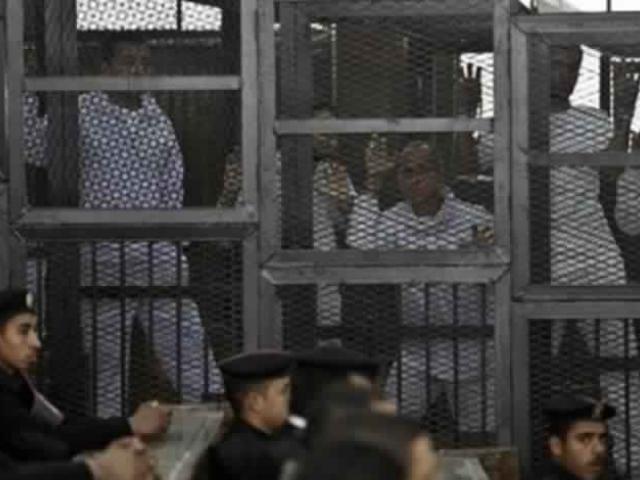
Continuing to use the death penalty will not stop the violence: 12 death sentences in the “Storming Matai Police Station” case
Press Release
The Egyptian Initiative for Personal Rights (EIPR) condemns the verdict issued on Monday 7 August in case no. 8473/2013, before Minya Criminal Court, commonly known as the “Storming Matai Police Station” case, in which 12 defendants were sentenced to death and 119 others were sentenced to life in prison, 110 of which are currently in detention, although not all were present in court. Other defendants in the case, who were present in court, were sentenced to 10 years in prison, while verdicts were also handed to 21 defendants who remain at large and dropped in the case of four defendants who are deceased. The court acquitted 238 defendants in the case.
Those sentenced to death are: Saadawy Abdel Kadder, Ismail Khalaf Mohamed, brothers Hany Mohamed al-Shorbagy, Mohamed Mohamed al-Shorbagy and Ahmed Mohamed al-Shorbagy, as well as Ramadan Hussein Ahmed, Mohamed Osman Shehata, Mohamed Sayed Galal, Abdel Moneim Salah Sholoqamy, Mohamed Aref Mohamed Abdallah, Yehya Gamal Osman and Mostafa Ragab Mahmoud.
The defendants faced 25 charges, according to their lawyers, including killing Colonel Mostafa Ragab al-Attar, the attempted murder of two other police officers, burning down a police station, seizing weapons and destroying property, as well as being members of the banned Muslim Brotherhood group and participating in an illegal gathering. The defendants, who have been sentenced to death, have one last chance to appeal the ruling before the Court of Cassation.
EIPR stresses the need for the courts to uphold the defendants’ right to a fair trial and expresses reservations concerning the court’s respect for the defense in what it has called “an absurd trial,” during which lawyers were only permitted to speak for two minutes for each defendant, and the court rejected requests made by the defense to hear from some witnesses and cross examine others. In addition, the court did not call on experts to analyze the videos that were used as evidence against the defendants. A previous ruling by the Court of Cassation to send the case back for retrial, described the camera footage as incorrect, the defense lawyers told EIPR researchers.
According to complaints by the defense team, the courtroom was too small to hold all the defendants at once, which meant their testimonies were divided across several sessions. An EIPR researcher also noted that the detention cells in which the defendants were held during the trial were too small for the number of defendants, and, as a result, one of the defendants fainted during the session to deliver the verdict.
EIPR also demands that an urgent and transparent investigation be opened into the alleged interference of the Minya chief investigator into trial proceedings. Although he took up his post a week after the incidents in question, the court based its ruling on many of his investigations. The chief investigator also added 130 defendants to the case on March 28, 2013, on his first day in his new position, which undermines the credibility of his investigations, in which more than 100 people faced charges.
The incidents began when Minya’s Matai police station was stormed and torched, killing Colonel Mostafa Ragab al-Attar on August 13, 2013, following the dispersal of the Rabaa and Nahda Square sit-ins.
The first court session in the case was held before Minya Criminal Court on March 22, 2014. The session, which only lasted for 30 minutes, saw the presiding judge Saeed Youssef Sabry reject requests by the defense team for the court to hear the testimonies of witnesses during the next session and reject further requests to cross examine prosecution witnesses, giving the lawyers only 24 hours to prepare their defense.
During the second session, on March 24, 2014, the court issued preliminary death sentences for 529 defendants, which were referred to the Grand Mufti for his opinion. On April 28, 2014, in the third session, 37 defendants, including Hatem Ahmed Zaghloul, who was underage at the time, were issued final death sentences, and 493 were sentenced to life in prison. The verdicts were annulled on January 24, 2015 by the Court of Cassation, which ordered that the case be retried. Preliminary death sentences were issued on July 11 and upheld on Monday August 7.
The Egyptian Initiative for Personal Rights described the case as a “waste of justice and a mockery of the rights of defense team,” in a joint statement with other rights organizations, after the first trial. UN experts have also described the verdict as a “mockery of justice.”
EIPR stresses that the continued issuing of death sentences does not guarantee the realization of justice, especially as the death penalty has been increasingly used this year, with 75 death sentences issued in July alone. This, EIPR argues, has not led to fewer security threats, but has decreased the chance of any transparent societal discussions as to the best means of countering those threats.



